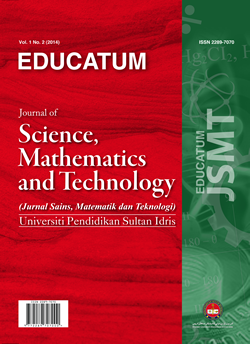Students’ self-regulated learning in open and distance learning for Mathematics course
DOI:
https://doi.org/10.37134/ejsmt.vol8.1.1.2021Keywords:
Mathematics, Self-Regulated Learning, Open and Distance LearningAbstract
The paper presents the study on self-regulated learning (SRL) using open and distance learning (ODL) for Mathematics course in Universiti Teknologi MARA (UiTM), Perak Branch, Tapah Campus. Some concerns with ODL mode are students’ academic performance, mathematical knowledge acquired, self-regulated learning when applying ODL alone throughout the entire semester. A sample of 347 among undergraduate students were collected at the end of March – July 2020 academic semester to measure level of self-regulated learning. Descriptive analysis was used to analyze the data. The findings indicated that the level of agreement for ODL has positive contributions to the students’ SRL.
Downloads
References
Ahern, T. C., & Repman, J. (1994). The effects of technology on online education. Journal of Research on Computing in Education, 26(4), 537–546. https://doi.org/10.1080/08886504.1994.10782109
Allam, S. N. S., Hassan, M. S., Mohideen, R. S., Ramlan, A. F., & Kamal, R. M. (2020). Online Distance Learning Readiness During Covid-19 Outbreak Among Undergraduate Students. International Journal of Academic Research in Business and Social Sciences, 10(5). https://doi.org/10.6007/ijarbss/v10-i5/7236
Barnard, L., Lan, W. Y., To, Y. M., Paton, V. O., & Lai, S. L. (2009). Measuring self-regulation in online and blended learning environments. Internet and Higher Education. https://doi.org/10.1016/j.iheduc.2008.10.005
Efklides, A. (2011). Interactions of metacognition with motivation and affect in self-regulated learning: The MASRL model. Educational Psychologist, 46(1), 6–25. https://doi.org/10.1080/00461520.2011.538645
Wan Abdul Aziz, W. N. H., Abu Hasan, N. I, Mohammad Hamzah, M. H., Abdul Aziz, R. W(2020). Pearson correlation coefficient of the student perception and challenges towards open and distance learning during COVID-19, vol. 1, no. 1, pp. 96–103. 1.
Eng, T. H., Li, V. L., & Julaihi, N. H. (2010). The relationships between students’ underachievement in mathematics courses and influencing factors. Procedia-Social and Behavioral Sciences, 8, 134–141.
Kaino, L.M. (2012). Teaching mathematics in Open Distance Learning (ODL): A challenge to quality instruction? Africa Education Review, 9(sup1), S91–S105. https://doi.org/10.1080/18146627.2012.755256
Kaino, Luckson Muganyizi. (2012). Teaching Mathematics in Open Distance Learning (ODL): Does it make a Difference with Teaching in the Traditional Approach? Huria - Journal of the Open University of Tanzania, 13(2), 346–357.
Keis, O., Grab, C., Schneider, A., & Öchsner, W. (2017). Online or face-to-face instruction? A qualitative study on the electrocardiogram course at the University of Ulm to examine why students choose a particular format. BMC Medical Education, 17(1), 1–8. https://doi.org/10.1186/s12909-017-1053-6
Kuo, Y. C., Walker, A. E., Belland, B. R., Schroder, K. E. E., & Kuo, Y. T. (2014). A case study of integrating interwise: Interaction, internet self-efficacy, and satisfaction in synchronous online learning environments. International Review of Research in Open and Distance Learning, 15(1), 161–181. https://doi.org/10.19173/irrodl.v15i1.1664
Lai, C. L., & Hwang, G. J. (2016). A self-regulated flipped classroom approach to improving students’ learning performance in a mathematics course. Computers and Education, 100, 126–140. https://doi.org/10.1016/j.compedu.2016.05.006
Moore, J. L., Dickson-Deane, C., & Galyen, K. (2011). E-Learning, online learning, and distance learning environments: Are they the same? Internet and Higher Education, 14(2), 129–135. https://doi.org/10.1016/j.iheduc.2010.10.001
Özsoy, G. (2011). An investigation of the relationship between metacognition and mathematics achievement. Asia Pacific Education Review, 12(2), 227–235. https://doi.org/10.1007/s12564-010-9129-6
Sharp, L., & Sharp, J. (2016). Enhancing Student Success in Online Learning Experiences through the Use of Self-Regulation Strategies. Journal on Excellence in College Teaching, 27(2), 57–75.
Singh, V., & Thurman, A. (2019). How many ways can we define online learning? A systematic literature review of definitions of online learning (1988-2018). American Journal of Distance Education, 33(4), 289–306.
Tabuenca, B., Kalz, M., Drachsler, H., & Specht, M. (2015). Time will tell: The role of mobile learning analytics in self-regulated learning. Computers and Education. https://doi.org/10.1016/j.compedu.2015.08.004
Tian, Y., Fang, Y., & Li, J. (2018). The effect of metacognitive knowledge on mathematics performance in self-regulated learning framework-multiple mediation of self-efficacy and motivation. Frontiers in Psychology, 9(DEC), 1–11. https://doi.org/10.3389/fpsyg.2018.02518
Yot-Domínguez, C., & Marcelo, C. (2017). University students’ self-regulated learning using digital technologies. International Journal of Educational Technology in Higher Education, 14(1). https://doi.org/10.1186/s41239-017-0076-8
Zimmerman, B. J. (2000). Self-Efficacy: An Essential Motive to Learn. Contemporary Educational Psychology, 25(1), 82–91. https://doi.org/10.1006/ceps.1999.1016
Zimmerman, B., & Kitsantas, A. (2007). Reliability and validity of self-efficacy for learning form (SELF) scores of college students. Journal of Psychology. https://doi.org/10.1027/0044-3409.215.3.157





